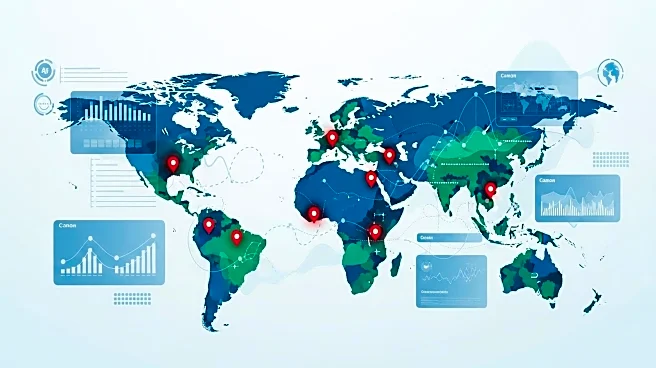What's Happening?
Former Vice President Al Gore has co-founded a nonprofit organization, Climate Trace, which has launched a new tool using artificial intelligence to track fine particulate pollution from over 660 million sources worldwide. This initiative aims to provide precise information about pollution levels and their sources, addressing a significant public health crisis. Fine particulate matter, often resulting from burning fossil fuels, is linked to numerous health issues, including lung cancer, heart disease, and other serious ailments. The tool offers both raw data and visualizations of pollution plumes, initially focusing on large cities, with plans to expand globally. This development follows Gore's involvement in environmental advocacy, particularly in Memphis, Tennessee, where he opposed a crude oil pipeline project.
Why It's Important?
The introduction of this AI tool by Climate Trace is significant as it provides a new level of transparency and accountability for polluters worldwide. By making pollution data accessible, it empowers communities and policymakers to take informed actions against environmental and health hazards. The tool's ability to visualize pollution plumes can help in understanding the spread and impact of pollutants, potentially leading to stricter regulations and cleaner technologies. This initiative could accelerate the transition away from carbon-intensive industries, fostering political and public support for sustainable practices. The health implications of fine particulate pollution are profound, with potential to influence public health policies and environmental regulations.
What's Next?
As Climate Trace expands its tool's capabilities, it is expected to cover more regions globally, providing comprehensive data on pollution sources and their impacts. This could lead to increased pressure on industries to adopt cleaner technologies and reduce emissions. Policymakers may use this data to implement stricter environmental regulations and promote sustainable practices. The tool's development may also inspire similar initiatives, leveraging AI to address other environmental challenges. Public awareness campaigns could further highlight the health risks associated with pollution, driving collective action towards a cleaner environment.
Beyond the Headlines
The use of AI in tracking pollution represents a broader trend of integrating technology into environmental monitoring and advocacy. This approach not only enhances data accuracy but also democratizes access to information, enabling grassroots movements to hold polluters accountable. The ethical implications of such transparency could lead to significant shifts in corporate responsibility and environmental governance. Additionally, the focus on health impacts may catalyze interdisciplinary research, combining environmental science with public health to develop comprehensive solutions to pollution-related challenges.










